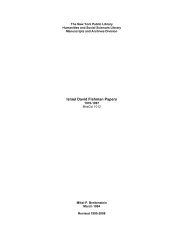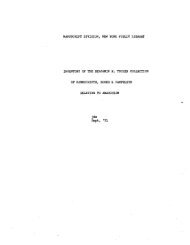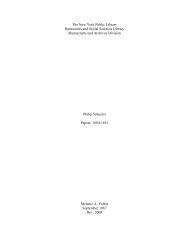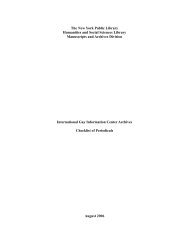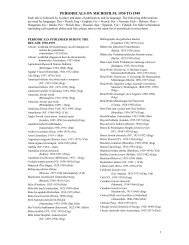pdf available - Multiple Choices
pdf available - Multiple Choices
pdf available - Multiple Choices
Create successful ePaper yourself
Turn your PDF publications into a flip-book with our unique Google optimized e-Paper software.
86 LUBOML<br />
tical activity: organizing youth into groups and<br />
having frequent conclaves and discussionsin<br />
the summer in fields and forest groves and in<br />
winter months in the party meeting-placeduring<br />
which we explained to our members the<br />
theory of the movement, its goals and aspirations<br />
and ways to bring them about in our daily life<br />
here as well as in future aliyah to Palestine.<br />
While our activities increased, the involvement<br />
of older youth broadened to include more<br />
segments of the population. In addition to the<br />
Poale Tsion party, the Tze'irei Zion party was<br />
established, after that the Hit'achdut, and after<br />
that the General Zionists and the Mizrachi.<br />
One of the important activities around which<br />
all party activities could gather was collecting for<br />
the Keren HaKayemet Le'Yisroel, and after that<br />
also for the Keren HaYesod. The outstanding<br />
volunteers who took on these worthy causes<br />
with great diligence and fervor were Beni<br />
Rozenfeld (z"1) and his wife Rivtse (née Reiz),<br />
may she have long life, who then emigrated to<br />
America.<br />
In time, cultural activity expanded, finding<br />
expression in the new reading rooms and new<br />
library (in addition to the one that had been<br />
established by HaShomer HaTsair), the banquets<br />
and lectures, the new choir and "mock trials" on<br />
various topical issues. These activities were accomplished<br />
by local talent as well as artists and<br />
lecturers from the outside, generally invited by<br />
the Union of Writers and Journalists in Warsaw.<br />
Add to these, of course, the visiting lecturers<br />
from the Keren HaKayemet and the Keren<br />
HaYesod and from the various political parties.<br />
Special mention ought to be made of the<br />
Keren HaYesod emissary Moyshe Rozenberg<br />
(nicknamed "Moysey"), who passed away a few<br />
years ago in Haifa, and the representative of the<br />
cultural center in Rovno, S. Rozenhak, who also<br />
died in Haifa, in 1969.<br />
Limiting Our Progress<br />
The local authorities did not look favorably on<br />
these activities and began in numerous ways to<br />
halt our progress. For instance, they forbade<br />
members of our movement, HaShomer HaTsair,<br />
to engage in scouting, and especially to parade<br />
through the streets of the city on Lag BaOmer, the<br />
20th of Tammuz, and other days. We had to get<br />
special permits, obtained with great difficulty<br />
through the intervention of the prominent citizens<br />
of the town.<br />
The authorities also decreed that we must<br />
have a permit for any meeting or assembly, even<br />
for having books or maintaining a reading room,<br />
not to mention for a performance. Getting a permit<br />
depended on bringing certification from the<br />
government censor (in Lublin) that the play contained<br />
no propaganda or anything derogatory<br />
against the authorities and government.<br />
Many times we engaged in our activities in<br />
secret; we often were taken to jail, from which we<br />
were freed after a day or two through the intervention<br />
of community leaders who assured the<br />
authorities we did not belong to the Communist<br />
party and that our only purpose was to organize<br />
youth to emigrate to Palestine.<br />
In this context I recall an incident that occurred<br />
in our town when a memorial was convened<br />
on the anniversary of the death of Dr. Max<br />
Nordau, of blessed memory. The hall was packed,<br />
and on a table two memorial candles flickered.<br />
Just then the Police commandant came by and<br />
began grilling us on the meaning of this meeting<br />
being held without a permit.<br />
One participant answered, in not very fluent<br />
Polish: "Sir, Max Nordau has died"but using<br />
the feminine form. The policeman, thinking we<br />
were holding a memorial service for a woman<br />
who had just passed away, was satisfied and<br />
went on his way.<br />
In fact, these persecutions never really let up.<br />
Government representatives always found another<br />
excuse to forbid our activities and put a stop<br />
to them, and each time they brought up their<br />
suspicions and fears that we were engaging in<br />
underground activity directed against the authorities.<br />
Persecutions and Pogroms<br />
In spite of oppression and persecution by the<br />
authorities, we continued our activities without<br />
let-up until war broke out between Poland and<br />
Soviet Russia in the summer of 1920.<br />
The attitude of the authorities toward Jew-



